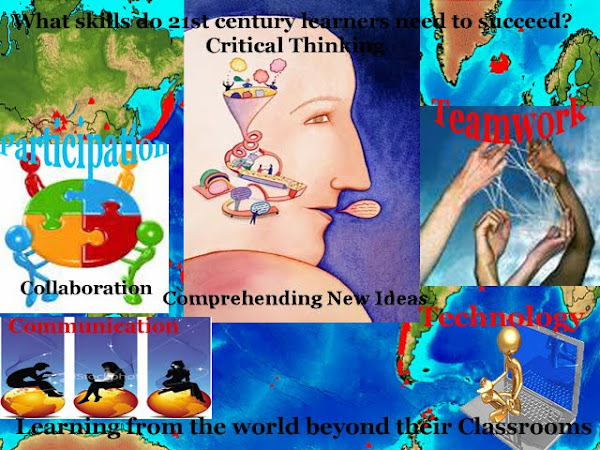21st Century Skills Learning for Life in Our Times
Authors Bernie Trilling & Charles Fadel,
The book I chose to do my book review on is a nonfiction book written about the need for incorporating 21st century learning skills into our education system. The authors of this book Bernie Trilling & Charles Fidel have been long time advocates of getting the necessary 21st century learning skills into the classrooms.
Bernie Trilling is a global director for Oracle Education Foundation, directing the development of education strategies, partnerships and services for the Foundation’s Thinkquest program.
Charles Fidel is a Global Lead for Cisco Systems, and the Cisco board member on the Partnership for 21st Century Skills, for which Cisco systems was a founding member.
“We are currently preparing students for jobs that don’t yet exist….using technologies that haven’t yet been invented…in order to solve problems we don’t even know are problems yet."
-Richard Riley, Secretary of Education under Clinton
This book focuses on what it is students need to learn in order to prepare for careers today. Students graduating today from secondary school, technical colleges, and universities are sorely lacking in some basic skills and a large number of applied skills:
· Oral and written communication skills
· Critical thinking and problem solving
· Professionalism and work ethic
· Teamwork and collaboration
· Working in diverse teams
· Applying technology
· Leadership and project management (Trilling & Fadel, 2009)
The authors of this book bring out the point that in order to compete in today’s world referred to as the Knowledge Age students need to learn these aforementioned skills.
“The rising demand for a highly skilled workforce also means that there will be a growing income gap between less educated, relatively unskilled workers and high educated, highly skilled workers. Routine tasks are increasingly being automated, and the routine jobs sill done by people barely paid a living wage. Routine work is moving to countries where the cost of labor is very low.” (Trilling & Fadel, 2009).
The book emphasizes the need to educate students today to be prepared for the high paying jobs that require complex skills and these jobs may not even exist today.
I found this book extremely memorable and interesting and I would encourage every teacher to read this book. It talked about education on a worldwide level and the importance that the entire world needs to be educated. The book made me think about what my own children are getting out of their public school education and sadly, it is not what it should be. As educators, we need to look at the 21st century skills and really, start emphasizes them in our own teaching. The examples in the book show how some schools are succeeding in implementing these 21st century skills and how other schools can follow in their lead.
“Research has shown that student learning gains are greatest when technology is seamlessly integrated with rich learning content, sound principle’s of learning, high quality teaching, and a aligned system of assessments, standards and quality learning experiences geared to the need of each child” (Group, 2006).
I strongly agree with this book as it emphasizes the importance of incorporating technology more into the classroom. School age children today were born into the technology age and most have been using different forms of technology since they were toddlers. Learning using technology alone will not benefit the student unless it is combined with the appropriate content. We can use technology as a tool but it is still about teaching our students the 21st century skills of inquiry, design, and collaborative learning projects that will prepare them for the real world.
The book raises some good points about expanding the learning environment beyond the walls of the classroom. The book emphasizes the need for whole learning environments that include the parents, teachers, peers, and experts to all be involved in a student’s education. Many countries have realized that in order to have a brighter economic future business communities and government officials have to work together to bring about changes in education.
The issue that I feel is most prominent in the book is that we are not educating our students enough in the areas that will be the most important when they are ready to start their careers. Our nation needs to be concerned that if we do not educate our students with these skills they will be at a disadvantage, and will lose jobs to others that have the skills. The book gives some examples of schools that are succeeding in teaching these skills, however I think the issue is much more pressing than the books brings up. As a nation, we are stuck in teaching only to pass standardized tests that do not address the skills that students are going need to compete in a global economy. In conclusion, we need to assess students but the assessments need to address the 21st century learning skills. It is important that everyone from business owners, government officials, administrators, parents, and teachers all collaborate and make sure that our graduating students will have the skills to help them be successful in this global economy.

No comments:
Post a Comment